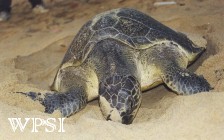'Operation Kachhapa’; Conservation of the Olive Ridley Sea Turtle
The State of Orissa on
India’s eastern coast witnesses a spectacular natural phenomenon
- the arribada or mass nesting of hundreds of thousands of  Olive
Ridley sea turtles. The turtles first congregate off shore to mate.
Then, on a few moonlit nights during December to March, thousands of
females land on the beach to lay eggs and then return to the sea. Olive
Ridley sea turtles. The turtles first congregate off shore to mate.
Then, on a few moonlit nights during December to March, thousands of
females land on the beach to lay eggs and then return to the sea.
Unfortunately, on the Orissa coast, about 16,000
fishing boats operate during the winter season. Some 8,000 of these
boats are large mechanised fishing trawlers and gill-netters that flout
laws prohibiting mechanised fishing within five kilometres of the
shoreline. Turtles are injured by the boats’ propellers and
slaughtered in the fishing nets - a staggering total of 100,000 dead
turtles have been washed ashore in the past decade, almost all of them
breeding adults.
“It is a tragedy with irreversible
implications. No species can survive such high mortality of its
breeding populations” says Belinda Wright.
WPSI launched Operation Kachhapa in September 1998 to try to stem the slaughter. Our
objective is to reduce turtle mortality and try to safeguard the future
of the species by concentrating on three main activities:
- To improve patrolling of non-fishing zones and the protection of nesting sites.
- To support legal action on turtle conservation and fishing law violations.
- To build public support and awareness of sea turtle conservation issues.
In collaboration with the Orissa State Forest Department and the
Wildlife Society of Orissa and other local NGOs, programme activities
have included:
- Providing the State enforcement authorities with sea-going patrol
boats, that have seized hundreds of trawling and gill-netting vessels;
- Organising field camps to protect and monitor turtle movements;
- Carrying out sea turtle mortality counts;
- Providing legal support to:
- Protect the sea turtles and their habitat
- Restrict illegal mechanised fishing
- Encourage trawlers to use mandatory turtle excluder devices (TEDs);
- Organising multi-language awareness programmes;
- Setting up a Turtle Interpretation Centre in Bhubaneshwar,
Orissa's capital, to help spread awareness of the need for conservation
activities;
- Providing logistical support to the UNDP Turtle Project.
A special turtle song was composed in Oriya,
Orissa's local language, so that traditional methods of communication
such as song, dance and story telling could be used in the awareness
programme. Two wandering minstrels have performed the song in over 160
villages.
Operation Kachhapa has had a significant impact on
the number of sea turtle deaths and public awareness of the problem.
But construction activity along the coast is relentless and sadly
thousands of turtles still die every year from the the illegal fishing
boats that ply off the coast of Orissa. The future of the Olive Ridley
sea turtle is still a matter of great concern.
|